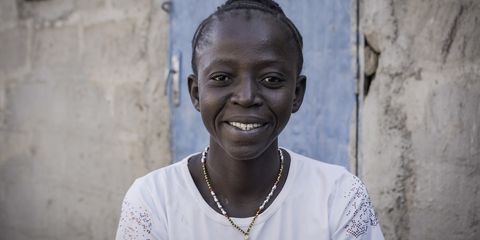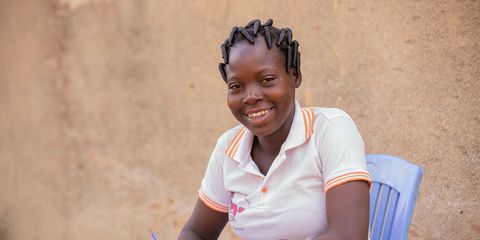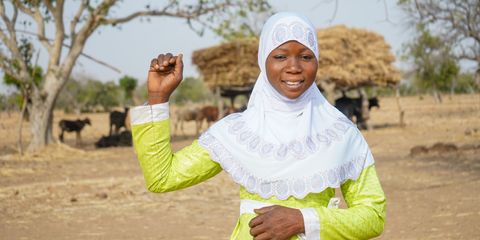Cherifatou knows only too well the suffering inflicted on the people of Burkina Faso, having spent time living in a conflict zone. She has supported several humanitarian projects run by Plan International.
Burkina Faso is going through the worst crisis in its history. Project supervisor Cherifatou* spent time living in one locality blockaded by non-state armed groups, supporting several projects implemented by our organisation. She tells us about the work and daily life of a humanitarian deployed in a conflict zone.
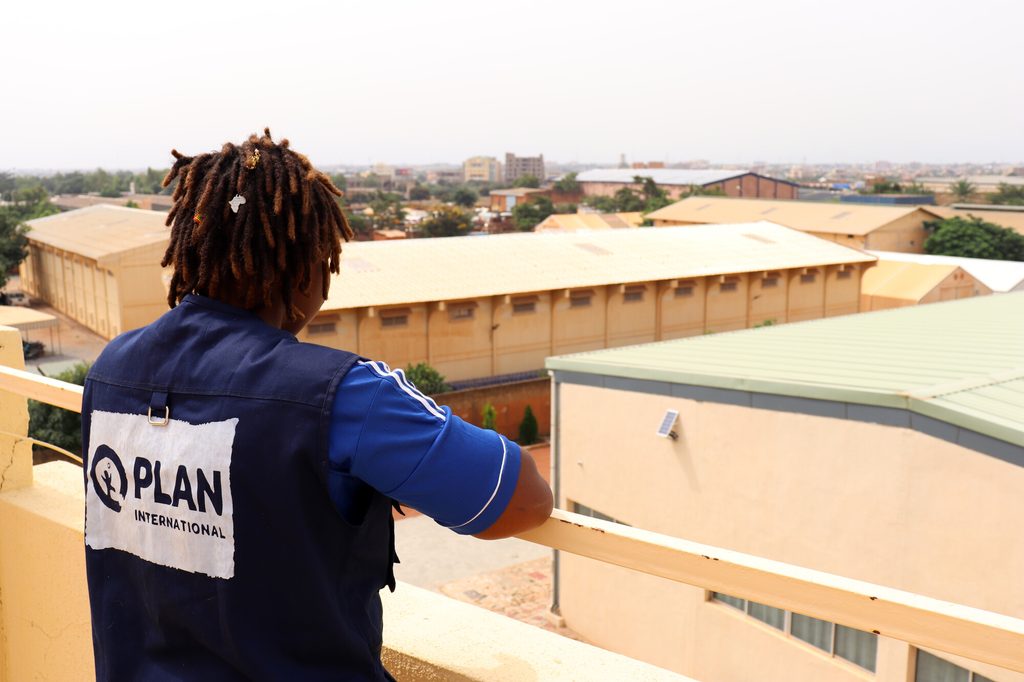
Cherifatou’s work as a project supervisor for Plan International involved a wide range of activities from child protection and tackling gender-based violence, to supporting income-generating activities and the construction of temporary shelters for those displaced by the conflict (her name has been changed to protect her identity).
“Most of the community members have fled, leaving their land to the displaced. They left because of hunger caused by the conflict and the lack of arable land. It is forbidden to grow maize and millet, because these crops grow high up and give armed groups a place to hide. Now the people living here can only grow groundnuts and sorrel,” she explains.
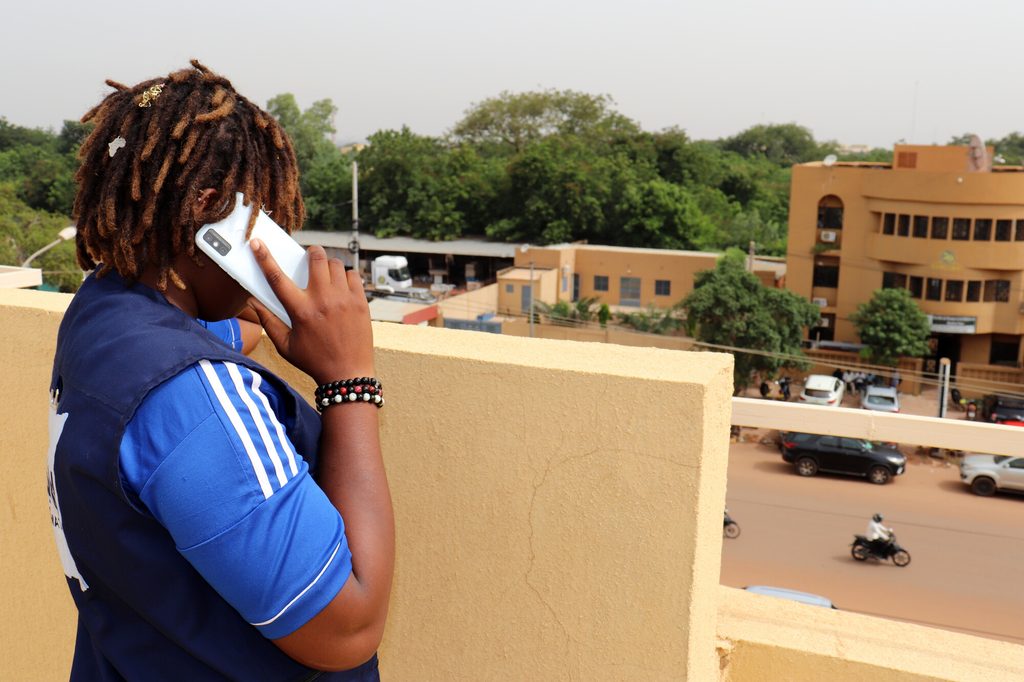
“People call to thank me, because before they had the shelters, they were sleeping in the pouring rain. When I get these calls, I’m happy.”
Project supervisor Cherifatou
On the frontline in a conflict zone
Life in a humanitarian crisis means dealing with difficult working conditions, such as lack of electricity. “In the office I shared with staff from another organisation, we had no electricity. When I needed to print a document or make photocopies, I went to the medical centre who allowed me to use their printer.”
To get to her post, Cherifatou was flown in by helicopter and stayed there for 5 months without being able to return. “The road is mined by improvised explosive devices, so civilians can’t use it,” she says. During the rainy season, flights are frequently cancelled and aircrafts are often undergoing maintenance. Sometimes they are also targeted by armed groups.
Although the blockaded localities are supplied with food, basic necessities, and equipment every 3 months by convoys under security escort, Cherifatou had to do without fresh produce and restrict her diet. “We had no condiments to cook with. I couldn’t find a bottle of gas either, so I had to cook my food over charcoal. Sometimes there was no coal either so I had to make do.”
Dealing daily with insecurity
Of all the challenges she had to deal with, the insecurity was Cherifatou’s biggest concern, and one that she had to cope with on a daily basis. “We could be in the middle of an activity with our project participants and suddenly there would be gunfire and we would have to stop. I often saw armed men at the entrance to the town. They’d be on their motorbikes, they’d get close, they’d fire in the air as they went along, and then they’d leave.”
Cherifatou says she got used to the sound of gunfire, just like the displaced people she lived with. “Before, the women would run when there was shooting, but now they lie on their stomachs and wait for it to calm down. Sometimes I’d see bullets flying over my head. Eventually I got used to it. There are other types of weapons, heavy weapons, which make a lot of noise, and then everyone is afraid. But when it is rifles, it is fine.”
Tending to people with bullet wounds became a common occurrence says Cherifatou. “Other people have been beaten or raped. We refer them either to the medical centre or to the social services.” To feed their families, girls and women would often pick leaves from the nearby bush. If they strayed too far from the town, they were threatened and attacked by armed men. “Faced with so many cases of violence against girls and women, I wanted to be able to do more. It’s really too much. I’ve witnessed so many terrible things,” says the humanitarian worker.
Twice, Cherifatou crossed paths with members of non-state armed groups. In 2022, with a gun pointed at her, she was searched, questioned and threatened. She remembers the fear she felt, and the relief when she was released after several hours.
“There’s no place where people are settled and need assistance that we can’t go ourselves. We must never give up.”
Cherifatou
When asked if she slept well at night, Cherifatou says no. It wasn’t the noise of the bullets that kept her awake, but rather the feeling of loneliness. Most of the staff members from other organisations who she had made friends with had left the town one after the other. However, Cherifatou was well integrated among the displaced people who supported her. “Neighbours often came to see me and asked me if everything was all right. Sometimes when I hadn’t been able to cook anything for myself, they would share with me the little food they had without expecting anything in return,” she recalls.
After 5 months of living in the most difficult conditions, Cherifatou returned home. “The training provided by Plan International and my previous experience enabled me to overcome such difficulties,” she says. “There were risks, but I remained calm. My parents were very worried. When they heard about attacks, they tried to check up on me. But they encouraged me. They’re proud of me!”
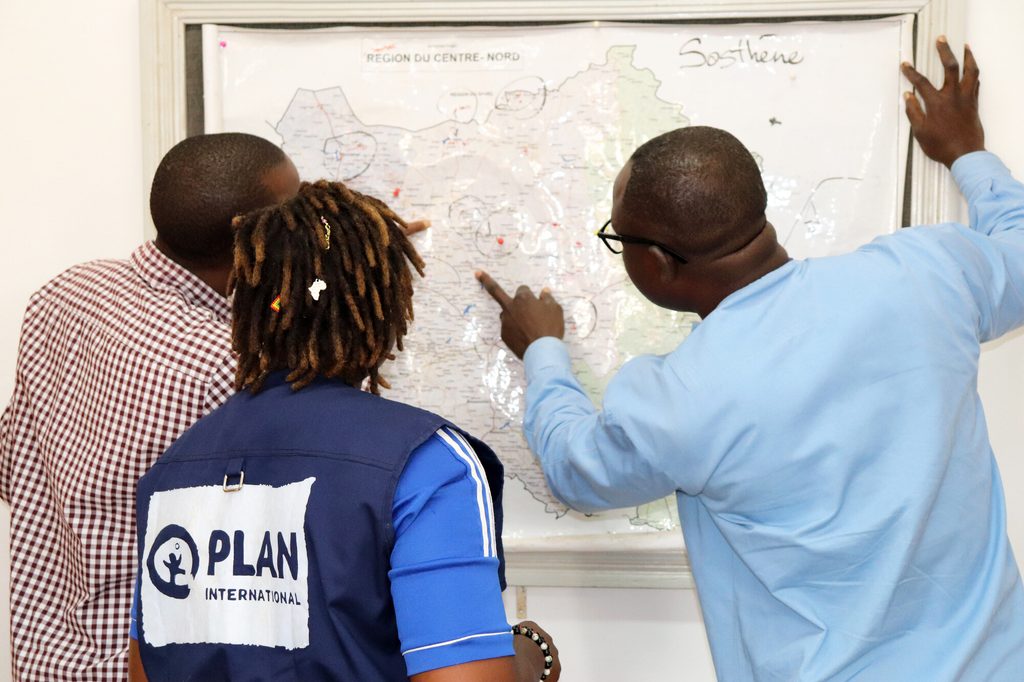
Today, Cherifatou has a sense of accomplishment. “Despite the transport difficulties, we were able to distribute materials to build 150 shelters. There are still people calling to thank me, because before they had these shelters, they were sleeping in the pouring rain. When I get these calls, I’m happy.”
Cherifatou says she feels that she has grown from her placement. “I wanted to experience the same realities as the people we serve. I was happy to be posted there because I’m from Ouagadougou. Unlike many Burkinabè, I don’t have a home village to which I’m connected. Going there was a chance for me to experience a different kind of life. There’s no place where people are settled and need assistance that we can’t go ourselves. If people are there, then we can be there too. We must never give up,” she concludes.
Growing insecurity has forced more than 2 million Burkinabè to flee their homes according to the official data. As of July 2023, over 1 million people were trapped in 36 localities under blockades imposed by non-state armed groups. In these areas, access to basic social services and essential supplies remains extremely limited leading to unprecedented levels of acute food insecurity.
*Cherifatou’s name has been changed to protect her identity.

